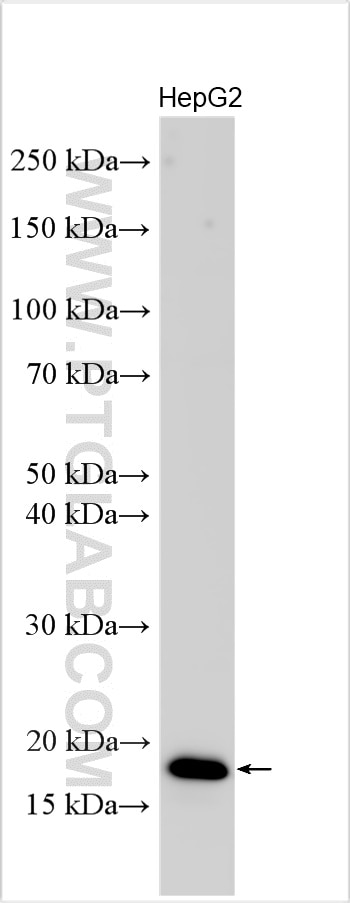Validation Data Gallery
Tested Applications
| Positive WB detected in | HepG2 cells |
Recommended dilution
| Application | Dilution |
|---|---|
| Western Blot (WB) | WB : 1:1000-1:4000 |
| It is recommended that this reagent should be titrated in each testing system to obtain optimal results. | |
| Sample-dependent, Check data in validation data gallery. | |
Product Information
15628-1-AP targets EIF4EBP2 in WB, ELISA applications and shows reactivity with human, mouse, rat samples.
| Tested Reactivity | human, mouse, rat |
| Host / Isotype | Rabbit / IgG |
| Class | Polyclonal |
| Type | Antibody |
| Immunogen | EIF4EBP2 fusion protein Ag8101 相同性解析による交差性が予測される生物種 |
| Full Name | eukaryotic translation initiation factor 4E binding protein 2 |
| Calculated molecular weight | 120 aa, 13 kDa |
| Observed molecular weight | 15-20 kDa |
| GenBank accession number | BC005057 |
| Gene Symbol | EIF4EBP2 |
| Gene ID (NCBI) | 1979 |
| RRID | AB_3669215 |
| Conjugate | Unconjugated |
| Form | Liquid |
| Purification Method | Antigen affinity purification |
| UNIPROT ID | Q13542 |
| Storage Buffer | PBS with 0.02% sodium azide and 50% glycerol pH 7.3. |
| Storage Conditions | Store at -20°C. Stable for one year after shipment. Aliquoting is unnecessary for -20oC storage. |
Background Information
EIF4EBP2(Eukaryotic translation initiation factor 4E-binding protein 2), also named as 4EBP2, is a member of the eukaryotic translation initiation factor 4E binding protein family. EIF4EBP2 is enriched in brain and acts as a regulator of synapse activity and neuronal stem cell renewal via its ability to repress translation initiation. EIF4EBP2 is a repressor of translation initiation involved in synaptic plasticity, learning and memory formation (PubMed:30765518).
Protocols
| Product Specific Protocols | |
|---|---|
| WB protocol for EIF4EBP2 antibody 15628-1-AP | Download protocol |
| Standard Protocols | |
|---|---|
| Click here to view our Standard Protocols |
